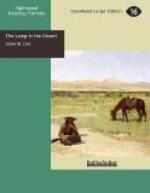Slowly the night wore on. The air blew in cool and pure with a soft whispering of spring and the brief splendour of the rose-time. The howl of a prowling jackal came now and then to her ears, making her shiver with the memory of Monck’s words. Away in the jungle the owls were calling upon notes that sounded like weird cries for help.
Once or twice she heard a shuffling movement outside the door and knew that Peter was still on guard. She wondered if he ever slept. She wondered if Tommy had returned. He often dropped into the Club on his way back, and sometimes stayed late. Then, realizing how late it was, she came to the conclusion that she must have dozed in her chair.
She got up with a sense of being weighted in every limb, and began to undress. Everard would be vexed if he returned and found her still up. Not that she expected him to return for a long time. His absence lasted sometimes till the night was nearly over.
She never questioned him regarding it, and he never told her anything. Dacre’s revelation on that night so long ago had never left her memory. He was engaged upon secret affairs. Possibly he was down in the native quarter, disguised as a native, carrying his life in his hand. He had a friend in the bazaar, she knew; a man she had never seen, but whose shop he had once pointed out to her though he would not suffer her—and indeed she had no desire—to enter. This man—Rustam Karin—was a dealer in native charms and trinkets. The business was mainly conducted by a youth of obsequious and insincere demeanour called Hafiz. The latter she knew and instinctively disliked, but her feeling for the unknown master was one of more active aversion. In the depths of that dark native stall she pictured him, a watcher, furtive and avaricious, a man who lent himself and his shrewd and covetous brain to a Government he probably despised as alien.
Tommy had once described the man to her and her conception of him was a perfectly clear one. He was black-bearded and an opium-smoker, and she hated to think of Everard as in any sense allied with him. Dark, treacherous, and terrible, he loomed in her imagination. He represented India and all her subtleties. He was a serpent underfoot, a knife in the dark, an evil dream.
She could not have said why the personality of a man she did not know so affected her, save that she believed that all Monck’s secret expeditions were conceived in the gloom of that stall she had never entered in the heart of the native bazaar. The man was in Monck’s confidence. Perhaps, being a woman, that hurt her also. For though she recognized—as in the case of that native lair down in the bazaar—that it were better never to set foot in that secret chamber, yet she resented the thought that any other should have free access to it. She was beginning to regard that part of Monck’s life with a dread that verged upon horror—a feeling which her very love for the man but served to intensify. She was as one clinging desperately to a treasure which might at any moment be wrested from her.




